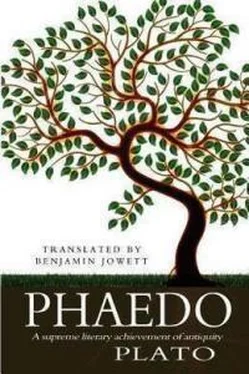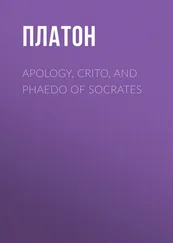Платон - Phaedo
Здесь есть возможность читать онлайн «Платон - Phaedo» весь текст электронной книги совершенно бесплатно (целиком полную версию без сокращений). В некоторых случаях можно слушать аудио, скачать через торрент в формате fb2 и присутствует краткое содержание. Год выпуска: 2014, Издательство: epubBooks Classics, Жанр: Философия, на английском языке. Описание произведения, (предисловие) а так же отзывы посетителей доступны на портале библиотеки ЛибКат.
- Название:Phaedo
- Автор:
- Издательство:epubBooks Classics
- Жанр:
- Год:2014
- ISBN:нет данных
- Рейтинг книги:3 / 5. Голосов: 1
-
Избранное:Добавить в избранное
- Отзывы:
-
Ваша оценка:
- 60
- 1
- 2
- 3
- 4
- 5
Phaedo: краткое содержание, описание и аннотация
Предлагаем к чтению аннотацию, описание, краткое содержание или предисловие (зависит от того, что написал сам автор книги «Phaedo»). Если вы не нашли необходимую информацию о книге — напишите в комментариях, мы постараемся отыскать её.
Phaedo — читать онлайн бесплатно полную книгу (весь текст) целиком
Ниже представлен текст книги, разбитый по страницам. Система сохранения места последней прочитанной страницы, позволяет с удобством читать онлайн бесплатно книгу «Phaedo», без необходимости каждый раз заново искать на чём Вы остановились. Поставьте закладку, и сможете в любой момент перейти на страницу, на которой закончили чтение.
Интервал:
Закладка:
For we do not argue merely from the analogy of the present state of this world to another, but from the analogy of a probable future to which we are tending. The greatest changes of which we have had experience as yet are due to our increasing knowledge of history and of nature. They have been produced by a few minds appearing in three or four favoured nations, in a comparatively short period of time. May we be allowed to imagine the minds of men everywhere working together during many ages for the completion of our knowledge? May not the science of physiology transform the world? Again, the majority of mankind have really experienced some moral improvement; almost every one feels that he has tendencies to good, and is capable of becoming better. And these germs of good are often found to be developed by new circumstances, like stunted trees when transplanted to a better soil. The differences between the savage and the civilized man, or between the civilized man in old and new countries, may be indefinitely increased. The first difference is the effect of a few thousand, the second of a few hundred years. We congratulate ourselves that slavery has become industry; that law and constitutional government have superseded despotism and violence; that an ethical religion has taken the place of Fetichism. There may yet come a time when the many may be as well off as the few; when no one will be weighed down by excessive toil; when the necessity of providing for the body will not interfere with mental improvement; when the physical frame may be strengthened and developed; and the religion of all men may become a reasonable service.
Nothing therefore, either in the present state of man or in the tendencies of the future, as far as we can entertain conjecture of them, would lead us to suppose that God governs us vindictively in this world, and therefore we have no reason to infer that he will govern us vindictively in another. The true argument from analogy is not, 'This life is a mixed state of justice and injustice, of great waste, of sudden casualties, of disproportionate punishments, and therefore the like inconsistencies, irregularities, injustices are to be expected in another;' but 'This life is subject to law, and is in a state of progress, and therefore law and progress may be believed to be the governing principles of another.' All the analogies of this world would be against unmeaning punishments inflicted a hundred or a thousand years after an offence had been committed. Suffering there might be as a part of education, but not hopeless or protracted; as there might be a retrogression of individuals or of bodies of men, yet not such as to interfere with a plan for the improvement of the whole (compare Laws.)
9. But some one will say: That we cannot reason from the seen to the unseen, and that we are creating another world after the image of this, just as men in former ages have created gods in their own likeness. And we, like the companions of Socrates, may feel discouraged at hearing our favourite 'argument from analogy' thus summarily disposed of. Like himself, too, we may adduce other arguments in which he seems to have anticipated us, though he expresses them in different language. For we feel that the soul partakes of the ideal and invisible; and can never fall into the error of confusing the external circumstances of man with his higher self; or his origin with his nature. It is as repugnant to us as it was to him to imagine that our moral ideas are to be attributed only to cerebral forces. The value of a human soul, like the value of a man's life to himself, is inestimable, and cannot be reckoned in earthly or material things. The human being alone has the consciousness of truth and justice and love, which is the consciousness of God. And the soul becoming more conscious of these, becomes more conscious of her own immortality.
10. The last ground of our belief in immortality, and the strongest, is the perfection of the divine nature. The mere fact of the existence of God does not tend to show the continued existence of man. An evil God or an indifferent God might have had the power, but not the will, to preserve us. He might have regarded us as fitted to minister to his service by a succession of existences,—like the animals, without attributing to each soul an incomparable value. But if he is perfect, he must will that all rational beings should partake of that perfection which he himself is. In the words of the Timaeus, he is good, and therefore he desires that all other things should be as like himself as possible. And the manner in which he accomplishes this is by permitting evil, or rather degrees of good, which are otherwise called evil. For all progress is good relatively to the past, and yet may be comparatively evil when regarded in the light of the future. Good and evil are relative terms, and degrees of evil are merely the negative aspect of degrees of good. Of the absolute goodness of any finite nature we can form no conception; we are all of us in process of transition from one degree of good or evil to another. The difficulties which are urged about the origin or existence of evil are mere dialectical puzzles, standing in the same relation to Christian philosophy as the puzzles of the Cynics and Megarians to the philosophy of Plato. They arise out of the tendency of the human mind to regard good and evil both as relative and absolute; just as the riddles about motion are to be explained by the double conception of space or matter, which the human mind has the power of regarding either as continuous or discrete.
In speaking of divine perfection, we mean to say that God is just and true and loving, the author of order and not of disorder, of good and not of evil. Or rather, that he is justice, that he is truth, that he is love, that he is order, that he is the very progress of which we were speaking; and that wherever these qualities are present, whether in the human soul or in the order of nature, there is God. We might still see him everywhere, if we had not been mistakenly seeking for him apart from us, instead of in us; away from the laws of nature, instead of in them. And we become united to him not by mystical absorption, but by partaking, whether consciously or unconsciously, of that truth and justice and love which he himself is.
Thus the belief in the immortality of the soul rests at last on the belief in God. If there is a good and wise God, then there is a progress of mankind towards perfection; and if there is no progress of men towards perfection, then there is no good and wise God. We cannot suppose that the moral government of God of which we see the beginnings in the world and in ourselves will cease when we pass out of life.
11. Considering the 'feebleness of the human faculties and the uncertainty of the subject,' we are inclined to believe that the fewer our words the better. At the approach of death there is not much said; good men are too honest to go out of the world professing more than they know. There is perhaps no important subject about which, at any time, even religious people speak so little to one another. In the fulness of life the thought of death is mostly awakened by the sight or recollection of the death of others rather than by the prospect of our own. We must also acknowledge that there are degrees of the belief in immortality, and many forms in which it presents itself to the mind. Some persons will say no more than that they trust in God, and that they leave all to Him. It is a great part of true religion not to pretend to know more than we do. Others when they quit this world are comforted with the hope 'That they will see and know their friends in heaven.' But it is better to leave them in the hands of God and to be assured that 'no evil shall touch them.' There are others again to whom the belief in a divine personality has ceased to have any longer a meaning; yet they are satisfied that the end of all is not here, but that something still remains to us, 'and some better thing for the good than for the evil.' They are persuaded, in spite of their theological nihilism, that the ideas of justice and truth and holiness and love are realities. They cherish an enthusiastic devotion to the first principles of morality. Through these they see, or seem to see, darkly, and in a figure, that the soul is immortal.
Читать дальшеИнтервал:
Закладка:
Похожие книги на «Phaedo»
Представляем Вашему вниманию похожие книги на «Phaedo» списком для выбора. Мы отобрали схожую по названию и смыслу литературу в надежде предоставить читателям больше вариантов отыскать новые, интересные, ещё непрочитанные произведения.
Обсуждение, отзывы о книге «Phaedo» и просто собственные мнения читателей. Оставьте ваши комментарии, напишите, что Вы думаете о произведении, его смысле или главных героях. Укажите что конкретно понравилось, а что нет, и почему Вы так считаете.










